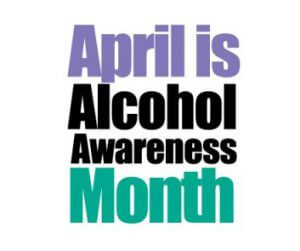 Alcohol Awareness Month provides a focused opportunity across America to increase awareness and understanding of alcohol use disorder, its causes, effective treatment, and recovery. The goals are to decrease stigma and misunderstandings in order to break down the barriers to treatment and recovery, and thus make help more readily available to those who suffer from this disease. Alcohol Awareness Month provides a focused opportunity across America to increase awareness and understanding of alcohol use disorder, its causes, effective treatment, and recovery. The goals are to decrease stigma and misunderstandings in order to break down the barriers to treatment and recovery, and thus make help more readily available to those who suffer from this disease.
According to the Youth Mental Health First Aid manual on page 73, “With heavy and prolonged use, alcohol can cause problems in many areas – physically, psychologically, and socially. People who regularly drink alcohol above recommended levels, particularly those who start at an early age, have an increased risk of developing an alcohol use disorder. People who suffer from anxiety or depressive disorders and drink heavily can show rapid improvement in their mood when they cut out alcohol. If a person is feeling suicidal they are more likely to attempt suicide when under the influence of alcohol.”
Every year, 6,500 people aged 21 and under die from alcohol-related consequences, some of whom were not even drinking themselves. In the past 30 days, 9% of Greene County 6th-12th graders, 11.6% of Taney County 6th-12th graders, and 7.8% of Stone County 6th-12th graders consumed alcohol, indicating a need for First Aiders to engage in conversation about the use of alcohol with the youth in our lives. A great resource for these conversations is http://www.talkaboutitmo.com/free-talking-kits/. Based on the different age groups you may be talking to, these kits will give ideas on how to maintain open lines of communication, model responsible behaviors, and set expectations.
How can Alcohol Awareness Month make a difference? We can use this month to raise awareness about alcohol misuse and take action to prevent it — both at home and in the community.
Here are just a few ideas:
· Encourage friends or family members to make small changes, like keeping track of their drinking and setting drinking limits.
· Share tips with parents to help them talk with their kids about the risks of alcohol use.
· Ask doctors and nurses to talk to their patients about the benefits of drinking less alcohol or quitting.
· Lock up and monitor the alcohol in your home so it’s not easily accessible for youth.
· If you are concerned about someone close to you, refer to ALGEE. There are a variety of professional resources available at cpozarks.org/mentalhealth.
Please go to https://www.alcohol.org/awareness-month/ for more information. |
